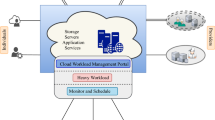Abstract
Co-occupant DoS assaults are discovered as most defenseless dangers in relation to distributed computing which is an asset and generally is obligatory in nature. Co-inhabitant DoS assaults would deplete out the cloud assets which impair the certifiable cloud clients from executing cloud utilization. Consequently, aversion and conclusion of the event related to co-inhabitant assaults result in fundamental assignment of cloud form. In our past research strategy, two-player game approach (TPGA) is acquainted which points that show evasion of co-inhabitant DoS assaults by learning and arranging the virtual machine requested from clients on account of the low, medium, and high hazard demands. Anyway, this strategy decreased in its execution regarding discovery of hazard dimension of client ask for VMs. There is no predefined method for recognizing hazard estimation of VM assets. And furthermore, it would be troublesome to keep up and refresh the hazard status data of the cloud assets. This is settled in the proposed research strategy by presenting the system called status monitoring system-based defense mechanism (SMS-BDM) or state observation-based co-resident DoS attack detection (SO-CRDoS-AD). In the proposed research technique, at first, hazard estimation of each asset dependent on client demands is assessed by utilizing hazard recognition metric. In light of this hazard metric esteem, state estimation of each client asks for as far as VM is refreshed. The states that are considered in this work are security state, vulnerability state, attacked state, positive state, negative state, degenerate state, and failure state. These state estimations of VM assets are refreshed occasionally with the assistance of Markov chain display. This examination technique is actualized in the CloudSim condition from which it is demonstrated that the proposed research strategy can guarantee the exact recognition of assault status of VM asks for; therefore, the security level can be upgraded.
Access this chapter
Tax calculation will be finalised at checkout
Purchases are for personal use only
Similar content being viewed by others
References
Yan Q, Yu FR, Gong Q, Li J (2016) Software-defined networking (SDN) and distributed denial of service (DDoS) attacks in cloud computing environments: a survey, some research issues, and challenges. IEEE Commun Surv Tutorials 18(1):602–622
Cardosa MD, Gopisetty S, Korupolu MR, Singh A (2016) U.S. Patent No. 9424094. U.S. Patent and Trademark Office, Washington, DC
Mijumbi R, Serrat J, Gorricho JL, Bouten N, De Turck F, Boutaba R (2016) Network function virtualization: state-of-the-art and research challenges. IEEE Commun Surv Tutorials 18(1):236–262
Han Y, Chan J, Alpcan T, Leckie C (2017) Using virtual machine allocation policies to defend against co-resident attacks in cloud computing. IEEE Trans Dependable Secure Comput 14(1):95–108
Han Y, Alpcan T, Chan J, Leckie C, Rubinstein BI (2016) A game theoretical approach to defend against co-resident attacks in cloud computing: preventing co-residence using semi-supervised learning. IEEE Trans Inf Forensics Secur 11(3):556–570
Zuo P, Hua Y, Wang C, Xia W, Cao S, Zhou Y, Sun Y (2017) Bandwidth-efficient storage services for mitigating side channel attack. arXiv preprint arXiv:1703.05126
Beaumont O, Eyraud-Dubois L, Lorenzo-del-Castillo JA (2016) Analyzing real cluster data for formulating allocation algorithms in cloud platforms. Parallel Comput 54:83–96
Nalinipriya G, Varalakshmi PJ, Maheswari KG, Anita R (2016) An extensive survey on co-resident attack in dynamic cloud computing environment. Int J Appl Eng Res 11(5):3019–3023
Levitin G, Xing L, Dai Y (2017) Co-residence based data vulnerability versus security in cloud computing system with random server assignment. Eur J Oper Res
Qiu Y, Shen Q, Luo Y, Li C, Wu Z (2017, August) A secure virtual machine deployment strategy to reduce co-residency in cloud. In: Trustcom/BigDataSE/ICESS, 2017. IEEE, pp 347–354
Ezhilchelvan PD, Mitrani I (2017) Evaluating the probability of malicious co-residency in public clouds. IEEE Trans Cloud Comput 5(3):420–427
Zhang Y, Juels A, Oprea A (2011) Home alone: co-residency detection in the cloud via side-channel analysis. In: 2011 IEEE symposium on security and privacy
Bates A, Mood B, Pletcher J, Pruse H, Valafar M (2010) Detecting co-residency with active traffic analysis techniques
Han Y, Alpcan T, Chan J, Leckie C (2011) Security games for virtual machine allocation in cloud computing
Calheiros RN, Ranjan R, Beloglazov A, De Rose CAF (2010) CloudSim: a toolkit for modeling and simulation of cloud computing environments and evaluation of resource provisioning algorithms
Author information
Authors and Affiliations
Corresponding author
Editor information
Editors and Affiliations
Rights and permissions
Copyright information
© 2020 Springer Nature Singapore Pte Ltd.
About this paper
Cite this paper
Rethishkumar, S., Vijayakumar, R. (2020). Status Monitoring System-Based Defense Mechanism (SMS-BDM) for Preventing Co-resident DoS Attacks in Cloud Environment. In: Ranganathan, G., Chen, J., Rocha, Á. (eds) Inventive Communication and Computational Technologies. Lecture Notes in Networks and Systems, vol 89. Springer, Singapore. https://doi.org/10.1007/978-981-15-0146-3_101
Download citation
DOI: https://doi.org/10.1007/978-981-15-0146-3_101
Published:
Publisher Name: Springer, Singapore
Print ISBN: 978-981-15-0145-6
Online ISBN: 978-981-15-0146-3
eBook Packages: EngineeringEngineering (R0)




